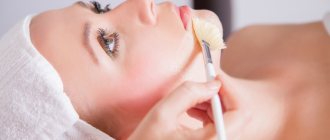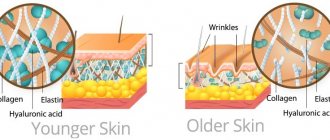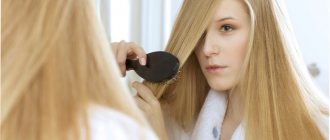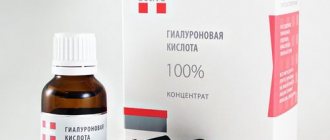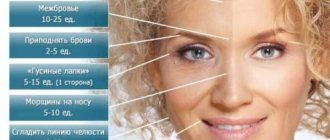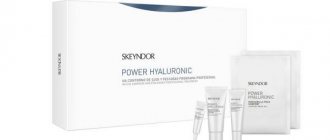During the period of time when a woman is pregnant, her body undergoes dramatic hormonal changes. And this does not always have a good effect on her skin on her face and body. But today, with the development of cosmetology, eliminating any skin flaw is not a particular problem.
But most women, when they come to a beauty salon or clinic, are surprised when they are denied a seemingly simple procedure such as mesotherapy.
Why are cosmetologists and doctors against undergoing such a procedure, for example, as facial mesotherapy, when a woman is in the beautiful stage of pregnancy? After all, as cosmetologists themselves claim, the procedure with “beauty injections” is painless and safe. In addition, the cocktails contain various vitamins, biostimulants and antioxidants, which are often prescribed to expectant mothers.
Our article will tell you whether mesotherapy procedures can be performed on expectant mothers at any stage of pregnancy, and we will also point out the possible risks and consequences.
The essence of the procedure
If you translate the name of mesotherapy, it will roughly sound like “treatment from the middle.” When performing this procedure, specially developed drugs are injected under the skin using a thin needle, laser, or non-injection method. These cocktails may include:
- Hyaluronic acid - moisturizes the skin, replenishes lost soft tissue volumes and stimulates collagen production.
- Multivitamin complexes provide the dermis with all the necessary nutrients and slow down the aging process.
- Fat burning components are substances that destroy fat cells and stimulate metabolic processes.
- Amino acids and peptides are protein compounds that are building materials for cells.
- Immunomodulators – increase the protective properties of the skin, help fight pathogenic microorganisms.
- Antibiotics – these drugs are used to treat acne.
In principle, high-quality cocktails are hypoallergenic and absolutely safe for humans. But during pregnancy, everything changes dramatically. And most cosmetic procedures and drugs are prohibited.
Why not
Often women turn to doctors with the question of whether it is possible to do facial mesotherapy during pregnancy and what kind. Doctors believe that you should abstain from the procedure throughout the entire period. Moreover, expectant mothers are always charming in themselves. And here are some completely logical arguments that justify such categoricalness:
- Getting drugs into the blood. Since punctures always damage the capillaries (as evidenced by the “bloody dew” appearing on the skin), some of the drugs enter directly into the bloodstream. This means that it can affect the body of the developing fetus. How this will happen is unknown. So it's better not to take risks.
- Danger of infection . This is especially true if the procedure is performed with a mesoscooter, which is a reusable instrument. But even when working with a conventional syringe or pneumatic gun, there is still the possibility of insufficient treatment of the surface of the skin or hands. Absolute sterility is guaranteed with laser fractional mesotherapy. But pregnancy is a categorical contraindication for this technique.
- Change in pain threshold. A pregnant woman's skin is much more sensitive. And those procedures that she previously tolerated easily become very painful for her. And the use of even local anesthesia is extremely undesirable.
- Psychological factor. It is also of great importance, since ordinary fear of the procedure can provoke: increased blood pressure, uterine hypertonicity, and a sharp hormonal surge. In the early stages, the most negative consequence can be a miscarriage, and in the later stages, premature birth.
In addition, post-traumatic skin pigmentation is a common phenomenon in pregnant women. It can also appear after mesotherapy on the face.
STOP PEELINGS for pregnant women
Experts usually advise abandoning any aggressive methods during pregnancy or breastfeeding and prefer natural ingredients and gentle home cleanings.
Some types of exfoliation are prohibited during this period: for example, chemical peeling during pregnancy (medium or deep), laser rejuvenation, ultrasound or diamond exfoliation, cryotherapy.
12-18 MONTHS during pregnancy and lactation THE following are STRICTLY PROHIBITED:
| PEELING METHODS | REASONS FOR THE BAN |
| Hardware exfoliation: |
|
|
|
Acids:
|
|
Features of different periods
The harm that mesotherapy can cause varies at different stages of pregnancy. It’s not for nothing that it is divided into trimesters. Each period has its own characteristics that affect the outcome and consequences of the procedure. Here's what experts say about it.
First
Recently, family planning has been widely promoted. And it’s not in vain. Often a woman finds out that she is carrying a child under her heart in the second or even third month of pregnancy. And until this moment he continues to lead his usual lifestyle. Including visiting a cosmetologist, performing hardware and injection procedures.
Mesotherapy is very dangerous during early pregnancy, because the fetus is not yet protected by the placental barrier, which filters toxins and substances harmful to it. And in the first trimester, the formation of all vital organs and systems occurs. Some components of mesotherapy cocktails can provoke congenital diseases.
Second
The smoothest and calmest period of pregnancy. Toxicosis usually passes by this time, the baby’s bloodstream is separated from the mother’s by the placenta, therefore, if necessary, at this time it is even allowed to take previously prohibited medications.
For medical reasons, oxygen mesotherapy sessions can be carried out with great caution from the fourth month. This should only be done by a specialist. Performing any procedures on your own at home is categorically unacceptable.
Third
In principle, starting from the seventh month, the baby is already viable. But every additional day in the mother's womb allows it to develop and get stronger. This is why it is so important to prevent premature birth. And they can be provoked by many factors, some of which are also present in a mesotherapy session:
- severe stress - may occur due to fear of the procedure;
- hormonal surge - when fear or excitement is produced, adrenaline is produced;
- high blood pressure - it is provoked by drugs with caffeine used in anti-cellulite therapy.
An infection that gets into the blood can also negatively affect the course of pregnancy and the condition of the fetus. And this can happen after the procedure if the formed crusts are accidentally or intentionally torn off.
Is mesotherapy allowed during pregnancy?
Mesotherapy during pregnancy is contraindicated. However, the opinion of cosmetologists is ambiguous regarding beauty injections during pregnancy planning. On the one hand, mesotherapy is considered a harmless and safe procedure. Hyaluronic acid, collagen, and vitamins are injected into the subcutaneous layers. All these substances are related to the human body and rarely cause side effects.
But, on the other hand, the effect of the active components of mesococktails on fetal development has not been studied for ethical reasons. Once injected, fillers are not permanently in place. They are slowly eliminated from the body and enter the bloodstream and lymph. No one knows what consequences this may lead to. But the effect of mesotherapy lasts for at least six months, even a year or more.
According to some studies in the USA, hyaluronic fillers may contain preservatives that can negatively affect fetal development and also cause autism in children. But so far such data has not been confirmed one hundred percent.
It is difficult to accurately calculate the timing of conception. Therefore, no competent doctor will definitely answer whether or not to do mesotherapy when planning a pregnancy. It all depends on how long the woman expects to become pregnant and the drugs administered.
It is important to note: if any deviations begin during pregnancy, the blame can be shifted to the doctor who performed the mesotherapy. Therefore, it is much wiser to postpone all procedures until the baby is born.
Moreover, pregnancy can nullify all efforts.
Experts are even more categorical regarding mesotherapy injections in the early stages. The slightest disturbances in formation can provoke a miscarriage or developmental defects of the child.
There are cases when a woman loses a child as a result of mesotherapy even before she found out about pregnancy. The administered drugs negatively affect the development of the fetus, so conception does not occur, or embryo rejection or spontaneous abortion occurs.
Injection mesotherapy during pregnancy is dangerous for the following reasons:
- The reactions of a pregnant woman's body change greatly. Even the most common things can cause allergies. No one knows what effect to expect from the introduced active substances.
- The effect of mesococktail components on fetal development has not been fully studied.
- The allergic reaction of the mother’s body immediately negatively affects the condition of the child. This can lead to miscarriage or birth defects.
- During pregnancy, the pain threshold increases. And anesthetics are not used, as they are extremely dangerous. Unpleasant sensations can cause stress and miscarriage.
- Hyaluronic acid, various vitamin cocktails, and hormones penetrate the placental barrier and have a negative effect on the embryonic development of the child.
- It is inappropriate to carry out, since changes in appearance are caused not by a lack of nutrients, but by hormonal changes. After childbirth, most often everything returns to normal on its own.
- Due to decreased immunity, there is a high risk of developing inflammation if the doctor gives the injection incorrectly. And this leads to complications that are extremely difficult to correct, because most medications cannot be used.
It may seem that non-injection mesotherapy is an excellent alternative. However, it cannot be performed while the child is pregnant. Even with non-invasive facial mesotherapy, active substances enter the body, which can have a negative effect on the development of the fetus. There remains a high risk of allergies and complications.
In rare cases, if there are medical indications, oxygen mesotherapy for hair (very severe and noticeable hair loss, that is, baldness) is allowed. This is usually due to hormonal changes in the mother’s body, as well as the redirection of vitamins and microelements to the child. Because of this, the blood supply to the hair follicle is disrupted, which leads to a deterioration in trophism and metabolic processes.
As a result, the strands become thinner, lose their firmness, elasticity and fall out. Treatment of this problem is carried out both internally by taking special vitamins and minerals, and externally with injections. But the effect is carried out locally, only on the area of baldness.
Before carrying out this procedure, consultation with various specialists is necessary: gynecologist, therapist, dermatovenerologist, endocrinologist, trichologist. There is a possibility that scalp mesotherapy will not bring results. After childbirth, when hormonal levels are restored, the problem will go away on its own.
Read more in our article about mesotherapy during pregnancy.
Categorical prohibition
You should not even think about performing mesotherapy during pregnancy in the following cases:
- with severe toxicosis, the body’s reaction to the administration of drugs can be unpredictable;
- if there is a threat of miscarriage and the tone of the uterus is increased;
- women over 35 years of age – they have more natural risk factors.
Under no circumstances should home portable electrical appliances be used to perform needle-free mesotherapy. Their use is prohibited throughout pregnancy.
Problems understandable to almost every mother in labor
Mesotherapy is a procedure that will help get rid of stretch marks that appeared after childbirth. But they will have to be prevented using other methods.
Throughout pregnancy, while in the shower, you should do a light massage of those areas of the abdomen where stretch marks usually form. The appearance of slight redness is enough. After a shower, rub with a towel and use a herbal moisturizer.
Caffeine masks and scrubs will help cope with swelling of the second trimester. You also need to consult with your gynecologist to find out which vitamin complexes can be consumed and in what form.
Summing up
According to the reviews of most women on the forums of expectant mothers, there is objectively no need for hardware or injection cosmetic procedures while carrying a baby. Yes, acne or pigmentation characteristic of an “interesting situation” may appear on the face, but they quickly disappear after childbirth.
Mesotherapy during pregnancy can do more harm than good and is an additional risk factor. Therefore, it is better to refuse it. If there is an urgent need to improve the condition of facial skin, before oxygen therapy you must consult with the supervising gynecologist and obtain permission from him to carry out the procedure.
An alternative method of solving the problem is massage and masks prepared according to folk recipes. They will help quickly improve your complexion, restore skin firmness and elasticity, tighten and even lighten it. And at the same time, such procedures are completely safe for the expectant mother and baby. And it is better to carry out more intensive therapy after childbirth or the end of the lactation period.
Is it possible to do hair removal during pregnancy?
Hair removal during pregnancy is not advisable. During this period, a woman's sensitivity increases. She reacts more sharply to procedures that cause pain and discomfort. During the session, the woman is tense, which negatively affects the child. A muscle spasm occurs, which can provoke a threat of miscarriage.
Despite the presence of certain risks, many pregnant women undergo hair removal. They choose the most suitable type of procedure for themselves. The following types of hair removal are distinguished:
- laser;
- waxy;
- sugar;
- electrolysis;
- hair removal with epilator;
- photoepilation.
The possibility of hair removal depends on how high the woman’s pain threshold is. Based on this, a suitable method of hair removal is determined.
Particular attention should be paid to hair removal in the bikini area and armpits. They are considered the most sensitive
Epilation is also questionable due to the risk of infection. The process of hair removal involves trauma to the skin. If you do not properly care for your skin after the procedure, an inflammatory process may begin.
IMPORTANT! When carrying out the procedure in the salon, it is necessary to give preference to a qualified specialist. The quality of the result directly depends on this. In the early stages, the risk of negative effects on the fetus increases
At later stages, sessions accompanied by pain can cause premature birth. The most optimal period for such procedures is the second trimester of pregnancy.
In the early stages, the risk of negative effects on the fetus increases. At later stages, sessions accompanied by pain can cause premature birth. The most optimal period for such procedures is the second trimester of pregnancy.
Laser
Laser hair removal is a relatively new practice. The effect of the procedure on the fetus is not fully understood. Laser hair removal allows you to get rid of hair for a long period of time. But how the pregnant body will react cannot be predicted.
There is a risk of developing pigment spots on the skin. There is also a possibility that the procedure will be ineffective. Laser exposure is accompanied by pain. It harms the child. Despite the listed disadvantages, there is no direct prohibition on holding a session.
Wax
Hair removal using wax is called bioepilation. This method can only be practiced if the woman has done it before. Bioepilation is considered quite painful. During pregnancy, it should not be performed if you are prone to varicose veins.
Sugar
Sugar hair removal is called sugaring. The hair removal technique is similar to waxing. The difference lies in the material used. For sugaring you will need sugar paste heated to a certain temperature.
Sugaring is not recommended at the beginning of pregnancy, especially if there are contraindications.
Before the procedure, it is important to exclude the presence of skin diseases and allergic reactions to the components of the paste. Most often it is made on the basis of natural ingredients
Electrolysis
The process of hair removal using electric current is strictly contraindicated during pregnancy. To achieve the desired result, alkali and high temperatures are used. The procedure has a high level of effectiveness. It allows you to get rid of hair almost completely. But prolonged exposure to electrical impulses can lead to miscarriage.
ON A NOTE! According to statistics, shaving is the most common practice during pregnancy. This is a less effective, but safe and affordable method of hair removal.
Epilator
An epilator is a device that operates on the principle of tweezers. He pulls out several hairs at once. Using an epilator helps you get rid of hair for a long time, avoiding cuts to the skin. During pregnancy, the device can be used if the procedure has been previously practiced and tolerated successfully.
Photoepilation
Photoepilation is absolutely not suitable for pregnant women. The method has not been fully studied. Its impact on a child's development is impossible to predict. The action of photoepilation is based on the use of photo flashes. They are aimed directly at the hair follicle located under the skin.
